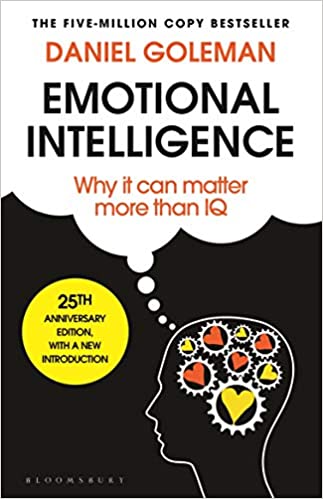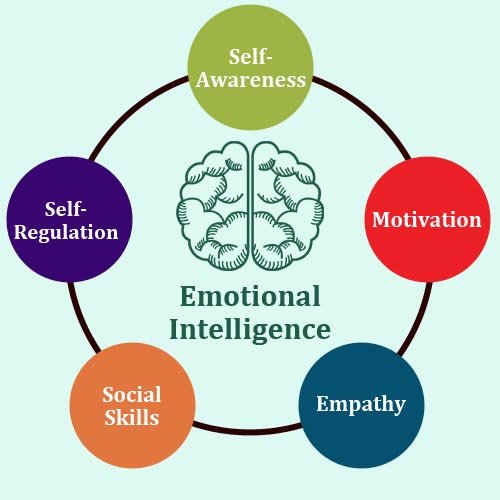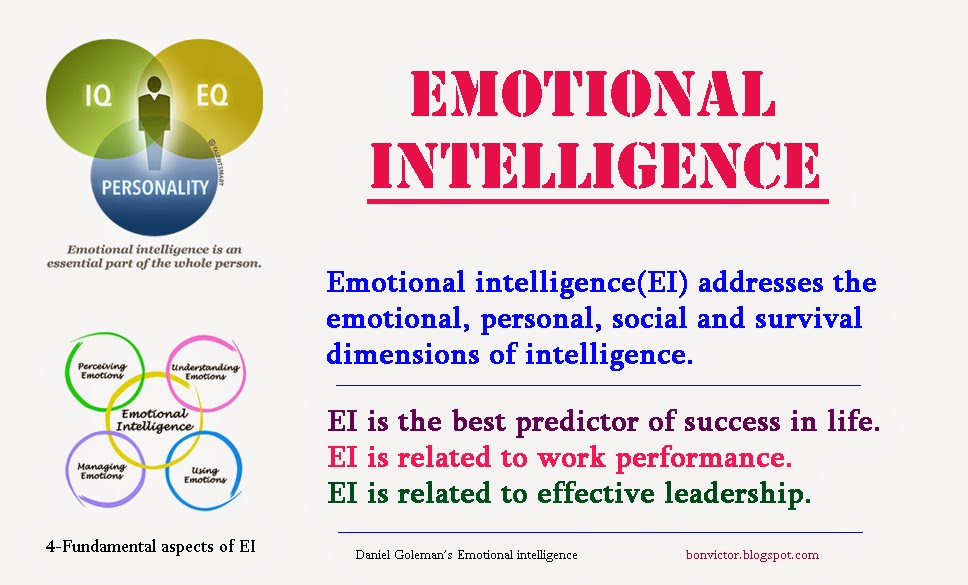As I was completing coaching training, I read some articles on Emotional Intelligence (EI). I was asked if EI was something I would use with clients. In my brain I said, “Just another jingoistic pop culture feel good way to sell books.” Out loud I said, “Maybe.” I thought no more about it for a while until a client asked if I could help him improve his EI. I said l would certainly try. So that started my love affair with Emotional intelligence. So, take it from me, if you are not familiar with EI, keep an open mind.
EI is sometimes referred to as EQ (Emotional Quotient). It is the ability to perceive, control, and evaluate your own emotions in positive ways. So it is easy to see why having strong EI can help relieve stress, communicate effectively and defuse conflict among other things.

In his book Emotional Intelligence, Daniel Goleman, an American psychologist, developed a framework of five elements that define emotional intelligence.

Self-Awareness
We define self-awareness as the ability to recognize and understand ones moods, motivations, and abilities and the effects they have on others. Goleman says to achieve a state of complete self-awareness, an individual must be able to monitor their emotional state and identify their emotions. Therefore, traits that prove an individual is emotionally mature include:
- Confidence
- The ability to laugh at one’s self and our mistakes
- The awareness of how others perceive you
Example: By reading the reaction of someone else, you know how they perceive you. (Goleman)
Self-Regulation
This includes the ability to control one’s impulses, the ability to think before you speak/react, and the ability to express yourself appropriately. Goleman defines emotional maturity in this component as being able to take responsibility for your actions, being able to adapt to change, and the ability to respond appropriately to other people’s irrational emotions or behavior.
Example: If someone is screaming at you, you should know that they are not always angry with you. In this case, you have the ability to understand they may be angry at a particular situation and feel they need to take it out on someone. Therefore, you do not take this personally or react with anger. (Goleman)
Motivation
Motivation includes having an interest in learning and self-improvement. It means having the strength to keep going when there are obstacles in life. It depends on setting goals and following through with them. Goleman would define an emotionally mature individual in this category as having traits such as initiative, commitment to complete a task and having perseverance in the face of adversity.
There are two types of goals: internal motivation driven goals and’ exterior motivation driven goals. Internal motivation driven goals include things such as earning a college degree or becoming a healthier person. These things show a drive for self-improvement. On the other hand, exterior motivation driven goals include things that flaunt wealth or status. These goals might include having the newest and nicest car.
Example: If a student fails a class, they see this as an opportunity to learn and retake the class without self-doubt. They do not let failure get in the way of their goal. (Goleman)
Empathy
This is the ability to understand other people’s emotions and reactions. You can only achieve Empathy if you have achieved self-awareness. Goleman believes that one must be able to understand themselves before they can understand others. Emotional maturity in this category includes having traits such as:
- Perception of others emotions
- Interest in other’s worries and concerns
- Ability to anticipate someone’s emotional response to a problem or situation
- Understanding society’s norms including why people act the way they do
Example: Being able to understand cope with someone else’s hardships or sadness. When you fully understand yourself and why you feel the things you feel, you can understand other people’s feelings even if they are different from yours. (Goleman)
Social Skills
If you have good Social Skills, you can do things such as:
- Pick up on jokes and sarcasm
- Provide customer service
- Maintain friendships and relationships
- Find common ground with others
Goleman states that emotional maturity in this component defines someone who has:
- Good communication skills
- Good time management
- The ability to be a leader or manage a group
- The ability to resolve conflicts using negotiation or persuasion
Example: Someone in a “boss” position usually has a good grasp on handling all different types of personalities. So, if two of their employees are having a conflict, they can find common ground and resolve the issue in a civilized and fair manner. (Goleman)

Emotional intelligence helps you build stronger relationships, achieve your goals and succeed personally and in your career. It can also help you understand your feelings. Also, it will improve your motivation and decision-making.
Although “regular” intelligence is important to success in life, many people believe that EI is at least as important. Many companies now test EI during hiring. So if you have not heard about how important EI is, now is a great time to learn.
So, for the next few weeks, we will be covering EI in depth including how to improve each of the categories. Also, if you want to know how YOUR emotional intelligence scores, you can take our quick Emotional Intelligence Quiz.
* Please leave a comment below. You may comment anonymously or you may use your first name. We may post or quote your comment on the website. We will never post or share your last name, email address or any other personal identifying information.
